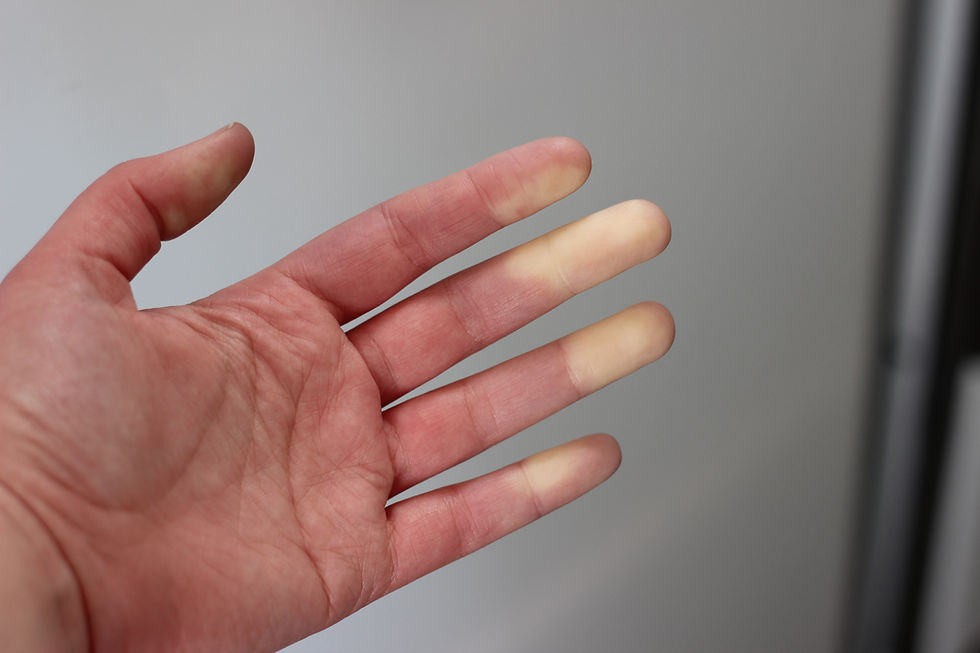Are Your Workers at Risk of HAVS? What Employers in Kent & London Need to Know
- Alice Monk

- May 27, 2025
- 3 min read
Hand–Arm Vibration Syndrome (HAVS) is a serious and preventable condition caused by regular use of vibrating tools and machinery. From car garages to construction sites, engineering workshops to manufacturing plants, many businesses across Kent, London, and the southeast unknowingly put their workers at risk every day.
And the cost of getting it wrong isn’t just human — it’s financial too. In a recent case, a car dealership was fined over £200,000 after two employees developed HAVS due to long-term use of sanders and saws. The Health and Safety Executive (HSE) found that the business had failed to assess risks properly, didn’t implement control measures, and had not trained employees about the hazards of vibration exposure.
If your staff use tools like grinders, strimmers, impact wrenches, or hammer drills, you may need to take action. Here's what you need to know.
What Is HAVS?
HAVS affects the nerves, blood vessels, and joints in the hand, wrist and arm. Early signs include:
Tingling and numbness in the fingers
Loss of hand strength
Fingers going white (especially in the cold) and becoming painful on recovery
Left unchecked, it can lead to permanent disability and affect someone’s ability to work or carry out everyday tasks.

Employer Responsibilities
Under the Control of Vibration at Work Regulations 2005, employers must:
Assess the risk of exposure to hand–arm vibration
Provide information and training to employees
Introduce controls to reduce vibration exposure
Carry out health surveillance where exposure is likely to pose a risk
Health surveillance should include regular HAVS assessments, starting with a Tier 1 screening (questionnaire), and progressing to Tier 2–4 based on symptoms.
Who’s at Risk?
Jobs involving regular use of vibrating tools or machinery carry a risk of HAVS. This includes:
Vehicle technicians and car body repairers
Grounds maintenance staff
Construction workers
Engineering and manufacturing operatives
Woodworkers and furniture makers
Even short bursts of exposure, if repeated regularly, can add up over time.
What Does a HAVS Assessment Involve?
At All Health Matters, we support employers to meet their legal duties by offering HAVS health surveillance tailored to the level of risk. Our process typically includes:
Tier 1 – Pre-placement questionnaire to identify any pre-existing symptoms
Tier 2 – Ongoing annual screening questionnaire for at-risk employees
Tier 4 – Medical assessment by an Occupational Health Physician where symptoms are reported or suspected
We don’t currently offer Tier 3 nurse-led assessments because, in our experience (and echoed by others in the field), these often lead to a Tier 4 review anyway. This can result in double costs for the client and add unnecessary steps. Where symptoms are clear or concerning, we recommend going straight to Tier 4, which is often more cost-effective in the long run and ensures timely clinical input.
Why It Matters for Employers
Failing to assess and manage the risk of HAVS doesn’t just lead to poor health outcomes — it can also result in enforcement action, reputational damage, and significant fines. It’s far better (and often more cost-effective) to put preventative measures in place now than deal with the consequences later.
Supporting Employers to Do the Right Thing
We understand that for some smaller businesses, especially those without an in-house H&S team, setting up health surveillance can feel daunting — and expensive. But failing to act puts your workers at risk and could end up costing far more in the long run.
At All Health Matters, we work with businesses of all sizes across Kent, London, and the southeast — from local garages to national manufacturers — and we’ll always try to find a solution that’s proportionate, practical, and cost-effective.
If you're unsure where to start, we're happy to talk you through the process and help you understand what's legally required - and what’s best practice. We're not into the hard-sell, just sensible, honest advice.
If you're booking for multiple employees or run a small or micro-business, we may be able to offer a package that makes it easier to get started.
Let’s Talk About Protecting Your Workforce
Whether you need help with a one-off assessment or want to set up an ongoing health surveillance programme, our occupational health specialists are here to help. We’ve supported businesses across Kent, London, and the southeast to stay compliant and keep their teams healthy.
📞 Call us on 01227 451233
📧 Or email admin@allhealthmatters.co.uk to get started




Comments